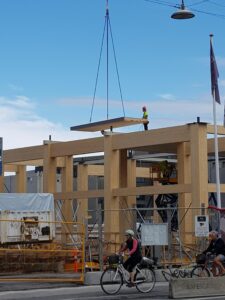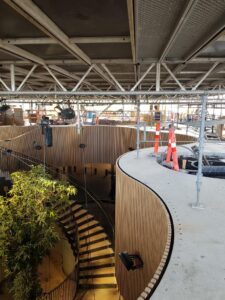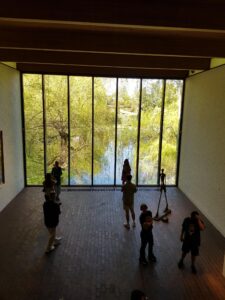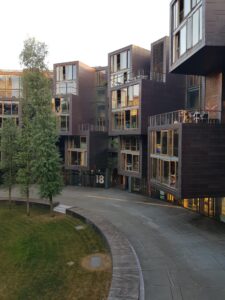Archive for October, 2023
Internship in Bilbao
- Automotive Engineering and Transport M.Sc.
- Spain, Bilbao
- FEV Iberia SI.
- 04/2023 – 09/2023
Application
I wanted to join the Erasmus mobility internship program with the primary goal of gaining international and intercultural experience. An important aspect of my application was that there was no formal process needed, as I had been working with the host company, FEV Consulting GmbH, for approximately half a year as a working student prior to this experience. This established connection eased out the process and facilitated my placement abroad. The choice of Bilbao, Spain as my destination was motivated by my desire to explore a country I had barely visited before, offering me the opportunity to dive into a new culture and language. Moreover, the presence of a FEV Consulting GmbH office in Bilbao made it a fitting location for my internship.
Accommodation and Living Expenses
Finding accommodation in Bilbao proved to be an interesting challenge, as my internship did not align entirely with the typical Erasmus semester. Student accommodations were already occupied, leaving little available options. Luckily, I found a shared apartment on idealista.com, where I lived with young professionals from Spain between the city districts Sarriko and Deusto. The apartment, although located slightly outside the city center, provided a comfortable place to live at a cost of 500€ per month, which included all expenses and even a cleaning service for common areas. It was recently renovated, though my private room was not particularly spacious, and the flat lacked a common living room outside of the kitchen. For future participants seeking accommodation in Bilbao, I recommend joining Facebook or WhatsApp groups for Erasmus students in advance to explore shared housing options. Alternatively, living in a hostel for an initial month while searching for a permanent flat is a viable option. Being present in the city allows for more convenient flat viewing. Important to highlight is not to search for a flat south of Calle Autonomia and the city district San Francisco. Crime rates a quite high and walking in the streets at night can be dangerous as many people get robbed there, even at daytime. Regarding living expenses, I found that approximately 350€ per month covered food and going out. Food prices were comparable to Germany, while drinks in bars were notably more affordable in Spain.
Internship
During my internship, I had an official eight-hour workday contract, although my effective working hours exceeded that throughout the entire internship. Within the consultancy firm, my responsibilities primarily involved desktop research and preparing presentations for the strategic management level of our clients. A significant highlight of my internship was to write my master’s thesis during a customer project, where I developed a Microsoft Excel model for assessing the cost of the battery recycling ecosystem. I also had the opportunity to give presentations in front of the customer, taking on additional responsibilities. Surprisingly, I found no significant cultural or professional differences when compared to the German offices of the company. This allowed me to seamlessly integrate into the work environment while making friends with my Spanish colleagues. The key takeaways in terms of work were advancing my proficiency in Microsoft Excel and internalizing the tools of a consultant. As the corporate language of the company is English, I couldn’t improve my Spanish language skills in the everyday work environment. Therefore, I remotely attended an intensive Spanish course at RWTH Aachen University with a scope of three hours per week, targeting language level A1. I highly recommend attending language courses in case the skills cannot be improved within the work environment.
Free Time
Bilbao offers several free-time activities, including visits to the beach, surfing, and hiking. The city’s closeness to nature and the well-established public transportation system with a metro and buses make these activities easily accessible. A must-visit are Sopelana Beach and Artxanda Mountain in particular. Additionally, I participated in cultural events such as the Pamplona bull run and city festivities that spanned 1.5 months, starting in early July. In Bilbao it is essential to know the Spanish language very well to make local friends, as most Basques do not speak English fluently. Furthermore, the attitude of the Basque people towards foreigners is rather closed, making integration into the society hard. To have a fun time, one should seek for making international friends which is quite easy when meeting other Erasmus students, as most of them have an open-minded attitude. Besides, it might be a good idea to search for tandem partner for both improving the language and getting to know local people. For exploring Bilbao, I highly recommend strolling around the city and visiting many different Pintxo bars. Besides, Bilbao has three main spots to go out. Calle Poza, Calle Ledesma and Casco Viejo. Calle Poza attracts mainly students and young people with its variety of bars. Calle Ledesma is a little bit more expensive and fancier, and the average age of people who go out there is slightly higher than at Poza. Casco Viejo is the old town of Bilbao. It’s very touristic and offers several interesting bars and restaurants at niche spots. Most common to go out are Plaza Nueva and Barrenkale. For those exploring Bilbao’s surroundings, I highly recommend visiting for example Pamplona, San Sebastian, Pikos de Europa, Bermeo, and Gernika. Being in Spain also offers the opportunity to visit Portugal or even Morrocco.
Conclusion
This Erasmus mobility internship experience has left a significant mark on my personal and professional development. I have integrated the lightheartedness of Spanish culture into my everyday life and mindset, which has brought a valuable perspective to my approach to work and life in general. Moreover, I learned the importance of balancing a busy consultant’s lifestyle with enriching free-time activities. This Erasmus+ mobility has further encouraged me to continue exploring foreign countries and cultures in the future. It has consolidated my belief in the great value of international experiences in shaping a well-rounded and adaptable individual.
Internship in Copenhagen
- Architecture M.Sc.
- Denmark, Copenhagen
- Cobe A/S
- 03/2023 – 08/2023
Search and preparation:

© Leonard Schneider
When looking for internships abroad I quickly came to the conclusion that I wanted to go to Copenhagen. The reasons for that are mainly twofold, with the city being home to an exceptionally broad range of offices being one, and the cities transformation over the last decades into one of the most liveable in Europe being the other. This again is intertwined, as the offices residing in the city both shaped it and are now exporting the Copenhagen brand of urbanism globally.
The architecture office Cobe is one that is deeply involved in these processes as it has designed a range of projects in the city, most notable the master plan for the 30-year transformation of the North Harbour area. I was therefore very happy to be working as part of the design team for half a year.
In applying to Danish architecture firms, it is important to be aware of the early timeline. The semester in Denmark stars before it does in Germany and that plays into the application process usually taking place in October/ November for the spring term and April/ May for the fall term with the internships usually beginning either in February or August, though there often are exceptions if you talk to your prospective office, especially regarding the German semester rhythm.
It might also be good to know, that the large offices often take up to multiple dozens of interns each year whereas smaller offices only have few openings.

© Leonard Schneider
Finances and apartments:
Financially a stay in Copenhagen is much more viable together with the Erasmus grant, as most offices only pay the equivalent of the Danish student grant (around 900€). Combining both sources of income allows an otherwise self-reliant stay.
Apartments are most commonly found via Facebook groups. There exist a lot of them, and it is important to go through a few to get a feeling of which are currently frequently posted to and whether it is mostly regular people or agencies. Typically, students are looking for apartments under 5000kr. This means cheaper apartments are extremely in demand and super hard to get if you are not able to commit longer than six months. Beware that in my experience and in talking to friends, some of the cheaper offers turn out to be scams. In my case I ended up finding a room in a flat share for around 6500kr, a budget that both extended the horizon of available rooms as well as allowing me to stay within my overall budget as described above.
There also exists the model of either families or older people renting out one of their rooms. I have mostly heard good things from friends about that.

© Leonard Schneider
Also be aware that most rooms are offered on a very short notice. It usually does not help to be looking months in advance, but in the six weeks before going. Contracts are also commonly signed after moving in.
Other formalities:
With moving to Denmark, you also have to register a few things. Those might still take a while, so try to get started as soon after arriving as you can.
First you must get your EU residence form (different process if you are not from the EU), then apply for a CPR-number and then with that you can get your tax-card and Danish bank account. All these are important for you to receive your salary. It might take up to three months, but most offices will offer to send you first pay checks also to a German bank, but not all as that makes taxation much harder for both sides.

© Leonard Schneider
Work and life in Copenhagen:
One of the biggest factors impacting life in Copenhagen is the season of the year. Depending on the month it might be either one of the most introverted or one of the most extroverted cities.
In the summer months the whole city is humming with people spending time in the public spaces, the water fronts in the harbours, or the many street side cafes and bakeries.
On the other hand, Danes will be snuggling up in their hygge apartments to escape the cold and dark season.
Tastes might differ, but I was very happy with my time spend going straight from the office to swim with the other interns in the harbour after work.
This brings me to my experience at work. I put both work and life into one paragraph as their coexistence was one of favourite things in my time there. Most offices work from 9:00 to 16:30 including a half hour lunch break. This of cause might differ before deadlines, but especially the Danish staff takes their time off very seriously,

© Leonard Schneider
with even management often packing up around 15:00 on Fridays, resulting in a very healthy work environment.
Additionally, most of my social contacts were from getting to know the many other interns at my office and from there also getting to know some more from other offices in the city. Having this immediate group of people at the same age and stage of their studies as you was a great way to find a place in the new environment.
Regarding my work, I got to help with design of multiple projects ranging from an architectural to an urban scale. For each project the teams and the seating arrangement changed, which helped with getting to know more people.
English is universally spoken, but in looking for an office it might still make sense to get a feel for whether the office is primary presenting itself in English or Danish. This might give and idea of the balance of the workforce being more or less international. Learning Danish is definitely not a requirement, but at least trying to learn while you are there is a guarantee to be on good terms with any Dane you come across. There also are free courses in the city to encourage that.

